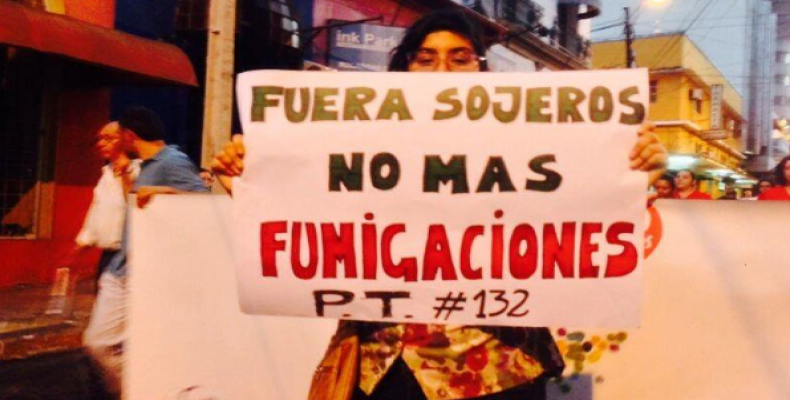Asunción, October 30 (teleSUR-RHC)-- As farmers from all across the country arrive in the Paraguayan capital on Thursday morning, rural indigenous women are actively leading the mobilizations against the soy-export economic model, which uses agrochemicals that are destroying the lives and the crops of farmers families living nearby.
Farmers gathered in Asunción, in front of Parliament, demanding President Horacio Cartes step down.
A few days earlier, the Conamuri organization denounced in a public statement the chemical fumigations of a Brazilian colony in Ytororo, in the Alto Parana department, saying the cultivation of soy for exportation there violates environmental norms.
The women claimed the fumigation made the surrounding pieces of land toxic and affected the 10 farm families living on them, putting at risk their health.
According to the protesters, the fumigations ruined this year's crops of mate — a South American plant many consume as a drink, which is grown in a sustainable way — corresponding to a tremendous financial loss for farm families.
A complaint was filed on October 13th, accusing the fumigation of having intoxicated the children from a nearby school.
A 12-year-old girl from the school recently died from symptoms similar to agrochemicals exposure, while pets and the forest fauna are dying daily in the area, said the complaint.
The women's group urged the Paraguayan state to investigate the case (for instance by running medical tests among the residents to confirm the contamination), and to expel Brazilian soy producer Wilmar Dos Santos from the country.
Paraguay is the fourth exporter of soy in the world, an industry which, along with cattle, contributes the most to the gross domestic product of the country.
However, the expansion of soy and corn crops provoked a rural exodus of about 900,000 rural workers to urban areas over a 10-year period, according to the National Peasant Federation, as those crops require fewer workers.
Paraguayan land distribution is among the most unequal in the world. According to Oxfam, about 2.5 percent of the population owns 85 percent of cultivable land, despite the fact that 42 percent of Paraguayans live in the countryside.


